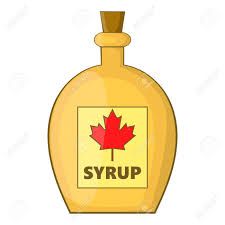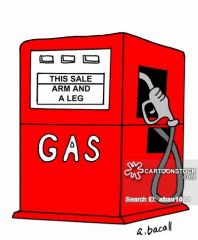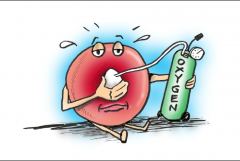![]()
![]()
![]()
Use LEFT and RIGHT arrow keys to navigate between flashcards;
Use UP and DOWN arrow keys to flip the card;
H to show hint;
A reads text to speech;
46 Cards in this Set
- Front
- Back
|
What is the definition of a solid? |
A solid is when the particles are close together, the particle bonds are strong, and there are only tiny vibrations of the particles. |
|
|
What is an example of a solid? |
Metal, people, etc. |
|
|
What is the definition of a liquid? |
A liquid is when the particles are close together, but the bonds are weak, and they can move about a bit. |
|
|
What is an example of a liquid? |
Water, juice, etc. |
|
|
What is the definition of a gas? |
A gas is when the particles can move freely, and the bonds are very weak (they are still just there though). |
|
|
What is an example of a gas? |
Oxygen, etc |
|

What state is this? |
Liquid |
|

What state is this?
|
Liquid |
|

What state is this? |
Gas |
|

What state is this?
|
Solid |
|
|
What do particles do when they are heated? |
They move around more. |
|
|
What do particles do when they are cooled? |
They slow down and stop moving around as much |
|
|
Think about how to draw states of matter. |
Okay, you can do it now |
|
|
What is the equation/formula for figuring out density? |
The equation/formula is: mass divided by volume, so for us it's: grams divided by cm3 |
|
|
How is the density written? |
(number)g/cm3 |
|
|
What is the density if it is: 4g, 5cm3 |
0.8g/cm3 |
|
|
Density if: 9g, 7cm3 (round it to nearest 100th) |
1.29g/cm3 |
|
|
Density if: 1cm3, 3g |
3g/cm3 |
|
|
Density if: 49123cm3, 20134g (round to nearest 100th) |
0.41g/cm3 |
|
|
What is it called when something changes states from a liquid to a solid?
|
Freezing |
|
|
What is Freezing? |
Freezing is the change of state from liquid to solid. It happens when heat is extracted. |
|
|
What is it called when something changes states from a solid to a liquid? |
Melting |
|
|
What is melting? |
Melting is the change of state from solid to liquid. It happens when heat is added |
|
|
What is it called when something changes states from a liquid to a gas? |
Evaporation |
|
|
What is evaporation? |
Evaporation is the change of state from liquid to gas. It happens when heat is added |
|
|
What is it called when something changes states from a gas to a liquid? |
Condensation |
|
|
What is condensation? |
Condensation is the change of state from liquid to solid. It happens when heat is extracted. |
|
|
What is it called when something changes states from a gas to a solid? |
Deposition |
|
|
What is deposition |
Deposition is the change of state from gas to solid. It happens when heat is extracted. It only happens in some substances like carbon dioxide (co2), and iodine. And it only happens if it is the right temperature and pressure is right. |
|
|
What is it called when something changes states from a solid to a gas? |
Sublimation |
|
|
What is sublimation? |
Sublimation is the change of state from solid to gas. It happens when heat is added. It only happens in some substances like carbon dioxide (co2), and iodine. And it only happens if it is the right temperature and pressure is right. |
|
|
What is expansion? |
Expansion is when an object becomes bigger, this happens when heat is added. They become bigger (the object, not the particles) because when the heat is added the particles move around more, meaning they are more spread out. |
|
|
What is contraction? |
Contraction is when an object becomes smaller, this happens when heat is extracted. They become smaller (the object, not the particles) because when the heat is extracted the particles move around less, meaning they are less spread out |
|
|
Give an example of when you need to take into consideration expansion and contraction |
Concrete slab, railway |
|
|
What is air pressure? |
Air pressure is when the particles of air are pushing on something. For example, a tire uses air pressure to stay inflated. |
|
|
What is diffusion? |
Diffusion is when the particles spread throughout a container (it can happen for gasses, liquids, and solids). As an example: if you open a bottle of perfume, it will spread throughout the room evenly (eventually), or if you put food dye in water, it will eventually be evenly coloured (even without stirring) |
|
|
Name the three types of heat transfer |
Conduction, convection, and radiation |
|
|
What is conduction? |
Conduction is when heat is transferred through a solid. It is done by the heat going into one particle, which crashes into another particle and transfers the heat, and this process goes on. |
|
|
What is convection? |
Convection is when heat is transferred through gasses or liquids. It happens when the particles are heated, so they rise, then more particles are heated, then they start to cool down so the descend, and then they are heated again and they rise and this process is repeated. |
|
|
What is radiation? |
Radiation is the heat transfer for anything (except for things which can block it out, like lead, or a big slab of concrete), it is used to transfer heat through space (how the sun's heat reaches us). It is also emitted out of everything (though not in big quantities), and the hotter something is the more radiation it emits/radiates. |
|
|
Is radiation hot? |
No, it's not, it isn't until it is absorbed that it makes things feel hot, because while it isn't hot it makes particles move faster, making things hotter. |
|
|
What does being a good conductor mean? |
Being a good conductor means that the substance is good at transferring heat quickly. |
|
|
What is an example of a good conductor? |
Solids are generally better but in particular metals (because they are more dense meaning it takes less time for the heat to be transferred from one particle to the next) |
|
|
What does being an insulator mean |
An insulator is a substance that isn't good at conducting heat, gasses and liquids are generally good insulators (because of being less dense) |
|
|
Why are saucepans and frypans made of metal, with plastic or rubber handles? |
Because metal is a good conductor of heat (so you can cook your food), and plastic and rubber are insulators (so you don't burn yourself) |
|
|
Give yourself a pat on the back |
Did you do it? |

